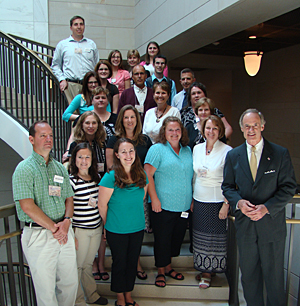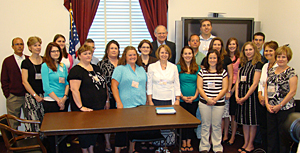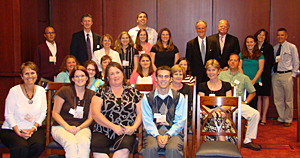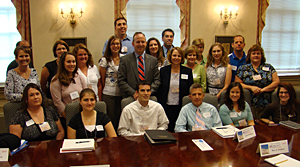- Rozovsky wins prestigious NSF Early Career Award
- UD students meet alumni, experience 'closing bell' at NYSE
- Newark Police seek assistance in identifying suspects in robbery
- Rivlin says bipartisan budget action, stronger budget rules key to reversing debt
- Stink bugs shouldn't pose problem until late summer
- Gao to honor Placido Domingo in Washington performance
- Adopt-A-Highway project keeps Lewes road clean
- WVUD's Radiothon fundraiser runs April 1-10
- W.D. Snodgrass Symposium to honor Pulitzer winner
- New guide helps cancer patients manage symptoms
- UD in the News, March 25, 2011
- For the Record, March 25, 2011
- Public opinion expert discusses world views of U.S. in Global Agenda series
- Congressional delegation, dean laud Center for Community Research and Service program
- Center for Political Communication sets symposium on politics, entertainment
- Students work to raise funds, awareness of domestic violence
- Equestrian team wins regional championship in Western riding
- Markell, Harker stress importance of agriculture to Delaware's economy
- Carol A. Ammon MBA Case Competition winners announced
- Prof presents blood-clotting studies at Gordon Research Conference
- Sexual Assault Awareness Month events, programs announced
- Stay connected with Sea Grant, CEOE e-newsletter
- A message to UD regarding the tragedy in Japan
- More News >>
- March 31-May 14: REP stages Neil Simon's 'The Good Doctor'
- April 2: Newark plans annual 'wine and dine'
- April 5: Expert perspective on U.S. health care
- April 5: Comedian Ace Guillen to visit Scrounge
- April 6, May 4: School of Nursing sponsors research lecture series
- April 6-May 4: Confucius Institute presents Chinese Film Series on Wednesdays
- April 6: IPCC's Pachauri to discuss sustainable development in DENIN Dialogue Series
- April 7: 'WVUDstock' radiothon concert announced
- April 8: English Language Institute presents 'Arts in Translation'
- April 9: Green and Healthy Living Expo planned at The Bob
- April 9: Center for Political Communication to host Onion editor
- April 10: Alumni Easter Egg-stravaganza planned
- April 11: CDS session to focus on visual assistive technologies
- April 12: T.J. Stiles to speak at UDLA annual dinner
- April 15, 16: Annual UD push lawnmower tune-up scheduled
- April 15, 16: Master Players series presents iMusic 4, China Magpie
- April 15, 16: Delaware Symphony, UD chorus to perform Mahler work
- April 18: Former NFL Coach Bill Cowher featured in UD Speaks
- April 21-24: Sesame Street Live brings Elmo and friends to The Bob
- April 30: Save the date for Ag Day 2011 at UD
- April 30: Symposium to consider 'Frontiers at the Chemistry-Biology Interface'
- April 30-May 1: Relay for Life set at Delaware Field House
- May 4: Delaware Membrane Protein Symposium announced
- May 5: Northwestern University's Leon Keer to deliver Kerr lecture
- May 7: Women's volleyball team to host second annual Spring Fling
- Through May 3: SPPA announces speakers for 10th annual lecture series
- Through May 4: Global Agenda sees U.S. through others' eyes; World Bank president to speak
- Through May 4: 'Research on Race, Ethnicity, Culture' topic of series
- Through May 9: Black American Studies announces lecture series
- Through May 11: 'Challenges in Jewish Culture' lecture series announced
- Through May 11: Area Studies research featured in speaker series
- Through June 5: 'Andy Warhol: Behind the Camera' on view in Old College Gallery
- Through July 15: 'Bodyscapes' on view at Mechanical Hall Gallery
- More What's Happening >>
- UD calendar >>
- Middle States evaluation team on campus April 5
- Phipps named HR Liaison of the Quarter
- Senior wins iPad for participating in assessment study
- April 19: Procurement Services schedules information sessions
- UD Bookstore announces spring break hours
- HealthyU Wellness Program encourages employees to 'Step into Spring'
- April 8-29: Faculty roundtable series considers student engagement
- GRE is changing; learn more at April 15 info session
- April 30: UD Evening with Blue Rocks set for employees
- Morris Library to be open 24/7 during final exams
- More Campus FYI >>
2:38 p.m., July 14, 2009----The 11th annual Democracy Project Summer Institute for Teachers offers teachers a unique opportunity to engage with state and national leaders, and the first session was held last month with the second planned for mid-August. The program is sponsored by the University of Delaware's Institute for Public Administration (IPA) and the Delaware Department of State, with support from the Delaware Heritage Commission.
Program director Ed Freel, former Delaware secretary of state under then-Gov. Thomas R. Carper and currently a policy scientist at the IPA, first partnered with the IPA to offer the Summer Institute in 1999. The program works with educators to improve the teaching of civics and democracy in Delaware classrooms. Since then, more than 150 teachers have had the opportunity to take the three-credit UD graduate course.
This summer, 20 Delaware teachers will meet with elected and appointed government officials, academics, jurists, lobbyists, and members of the press, who will recount their experiences and challenges and engage the teachers over two sessions. This year's program was developed by Fran O'Malley, Democracy Project curriculum director and policy scientist at the IPA; Lisa Moreland, associate policy scientist at the IPA; and Freel.
Throughout the summer, the teachers will be developing innovative lesson plans to take back to their classrooms in the fall and to share with their colleagues.
Highlights of the first session of the institute, which took place June 22-26, included group trips to Dover, Washington, D.C., and the Port of Wilmington. More than 25 speakers met with the group over the course of the week.
In Dover, the group met Gov. Jack Markell, who led a discussion entitled “Challenges of Leadership.” They also had lunch with lobbyists who shared their experiences and met members of the Delaware General Assembly.
In Washington, D.C., the group met with U.S. Rep. Michael N. Castle and U.S. Senators Carper and Edward E. “Ted” Kaufman and took tours of the U.S. Supreme Court and the Capitol Building.
At the Port of Wilmington, news anchor Allan Loudell from radio station WDEL met the group to talk about media and government, and the group learned about the state's court system from Judge Mary Miller Johnston of the Delaware Superior Court and Judge William L. Chapman, Jr., of the Delaware Family Court.
Freel said the field trips were designed to allow the teachers to meet and interact with various elected and public officials in candid discussions about their responsibilities and the challenges they face.
“At the end of the week, the teachers appreciated the opportunity they had to meet so many public officials. They were excited and energized by the experience,” he said. “It's not something you get an opportunity to do very often.”
During the second session, which will take place Aug. 10-12, the teachers will meet at the Virden Center at UD's Hugh R. Sharp Campus in Lewes to present their lesson plans in front of their peers. Selected lesson plans will be put on the Democracy Project Web site for the public to access.
The Democracy Project began in 1999 in response to a bipartisan national study, The New Millennium Project, funded by the National Association of Secretaries of State. The study reported that “young Americans have only a limited, vague understanding of what it means to be a citizen in a democratic society.” It also indicated that media, parents, political parties and schools all play a role in connecting young people to the democratic process.
The Institute for Public Administration, part of UD's College of Education and Public Policy, addresses the policy, planning, and management needs of its partners through the integration of applied research, professional development, and the education of tomorrow's leaders.
Article by Jon Bleiweis






